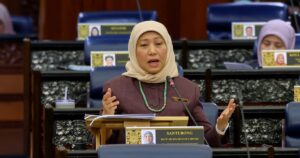GEORGE TOWN: Penang has redrawn its urban map for the first time in nearly six decades, declaring 25 new towns and expanding the boundaries of 10 existing ones to reflect its rapid transformation from rural landscapes to bustling city hubs.
The sweeping amendment, gazetted on Sept 4, affects more than 210,000 land titles and 84,000 strata titles across the state.
Chief Minister Chow Kon Yeow said the move comes as Penang’s population and economy have outgrown the state’s original town declarations made in 1966.
“Many areas, once designated as country land, have experienced substantial growth, and the state authorities are now responding to this by reclassifying large sections of land to reflect their urban status.
“This reclassification is essential for improving the administration of local governments and maximising the state’s economic potential,” he told newsmen at his office in Komtar here today.
With the changes, Penang now counts 42 towns – 17 existing and 25 new.
The existing towns are Bayan Lepas, Balik Pulau, Batu Ferringhi, Tanjung Bungah, George Town, Tanjung Tokong, Tanjung Pinang, Jelutong, Air Itam, Bukit Bendera, Gelugor, Bukit Mertajam, Prai, Sungai Bakap, Nibong Tebal, Kepala Batas and Butterworth. Except for Tanjung Tokong, Tanjung Pinang, Jelutong, Air Itam, Bukit Bendera, Gelugor and Prai, the other existing towns will see amendment to their boundaries.
The new towns are Bayan Baru, Batu Maung, Sungai Ara, Pulau Silikon, Bukit Jambul, Puncak Perdana, Perdana Mutiara, Pinang Emas, Bayu Emas and Lembah Permai.
Others include Alma, Bukit Minyak, Bukit Tengah, Bandar Perda, Seberang Jaya, Jawi, Bandar Cassia, Simpang Ampat, Bandar Tasek Mutiara, Sungai Dua, Teluk Air Tawar, Bertam, Tasek Gelugor, Pokok Sena and Ara Kuda.
Chow said the reclassification will reshape Penang’s administrative and economic landscape through new zoning, planning and taxation systems.
Property owners, however, will feel the changes in their tax bills.
“For over 210,000 landowners and 184,000 strata titleholders, these changes will result in higher taxes as their land is reclassified from country to town status.
“However, in an effort to ease the transition, the state government will delay the implementation of new strata property tax rates until 2027.
“This postponement will benefit more than 184,000 strata property owners across the state, allowing them to continue paying current tax rates through 2026,” he added.
According to PLANMalaysia, the federal town planning agency, the decision to reclassify certain areas is based on the Second National Urban Policy (DPN2), which emphasises the importance of urban areas having a minimum population density of 10,000 people. Additionally, regions with a high percentage of residents engaged in non-agricultural activities are also eligible for reclassification.
“With this amendment, Penang is better positioned to handle future development and economic opportunities. “For example, areas that were once considered rural or village or country lands, such as Batu Kawan and Bertam, are now being integrated into urban zones, reflecting their transformation into bustling hubs of activity,” Chow said.
© New Straits Times Press (M) Bhd






